Nature is the best teacher
24 June 2021
Nature is the best teacher and there is a lot we can learn from the way nature provides for all plants and ourselves. In nature, the various intertwined relationships that have developed over generations of co-existence are now the best that need no disturbance.
Tiyeni successfully helps smallholders to increase yields and grow the food needed for consumption on a smaller area of land, meaning cash crops can be grown to pay for vitals like children's education and farmers don't need to farm the marginal land, which presents the opportunity to increase biodiversity.
Fantastic yields are being harvested by Tiyeni's Deep Bed farmers this season and the careful process of weighing the produce is shown in the photographs below, taken at our central Hotspot project in Chiwamba.
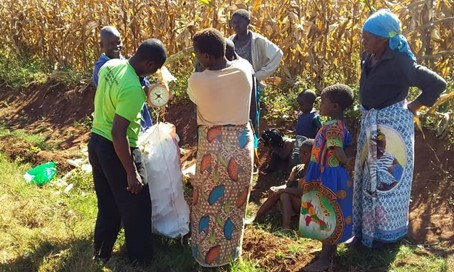
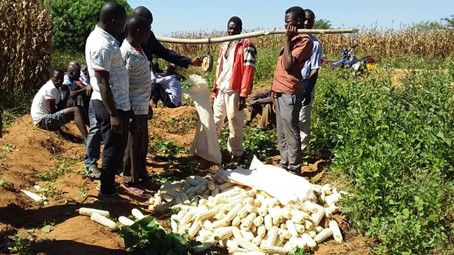
Farming in the World of Shifting Weather Patterns
Tiyeni joined a panel of soil experts for a webinar this month, titled Farming in the World of Shifting Weather Patterns, with The Soil Food Web School. Tiyeni Chair, Colin Andrews, joined Dr. Mary Cole and Dr . Elaine Ingham. Watch again here to see Dr. Ingham's take on Tiyeni’s compost recipe and fascinating reminders that what we cannot see is so important to our lives. You can also pick up a great tip from Dr. Cole for a ‘hot stick’ thermometer!
Zerodig partnership
Zerodig and Tiyeni share common growing system approaches and objectives to develop rural livelihoods. In 2021, Tiyeni and Zerodig began a new partnership to work together and maximise their collective output. Tiyeni is delighted that Zerodig is also directly supporting farmers in Malawi by donating a percentage of vegetable sales from their Oakbrook site.
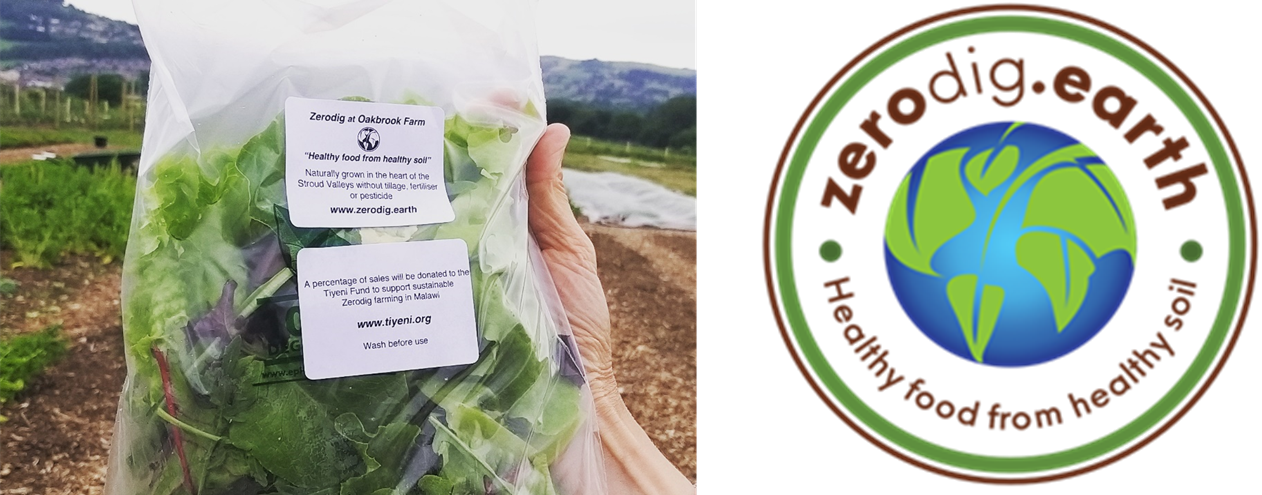
Zerodig is a not-for-profit social enterprise changing the future of food production with ‘no-dig’ growing. The Zerodig project is developing a network of small regenerative market garden growers providing vegetables and developing rural livelihoods in the UK.
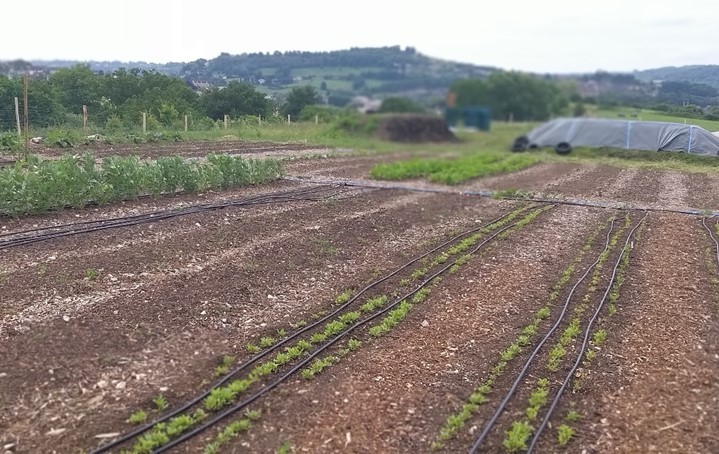
The Scandal of Soil Loss
The original inhabitants of Malawi – called the “Akafula”—lived off the land without disturbing the soil, but the introduction of farming has had devastating effects.
As our lives depend on plants, so plants depend on soil and soil is a complex material, built up slowly by the weathering of rocks and the breakdown of plant and animal matter by soil micro-organisms. Soil is created slowly. The US Department of Agriculture states that the normal rate at which soil is created is about a tenth of a ton per hectare annually.
Anyone living in tropical Africa will have seen signs of serious soil loss – tree roots which had been underground exposed on the surface, deep gullies on the hillsides and, above all, the rivers running the colour of cocoa in the rainy season. A survey by the Food and Agriculture Organization of the UN, carried out in 2014, found that the average rate of soil loss in Malawi was 29 tons per hectare every year. This compares ill with the slow rate of soil creation!
The picture below, taken in Mzimba district in 2009, typifies the ridge and furrow system practised widely throughout Malawi and indicates how so much soil has been lost. The maize crop is planted on shallow ridges which do not follow the contour of the land, and the furrows between the ridges are left open at the ends. Furthermore the underlying soil will have been compacted by constant treading, with the result that rainwater only slowly sinks into the ground. Consequently, heavy rainfall will send water gushing out between the ridges --- carrying soil with it at the rate of almost 30 tons from the hectare every year. Thus the real wealth of the country goes down the drain!
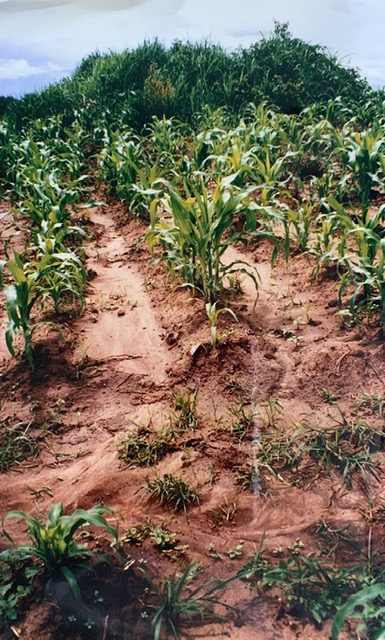
Once-productive land around the villages is now so depleted that yields of maize average only about a ton and a half per hectare – not enough to feed the nation, and the country waits on the doorstep of hunger.
The piece of land at Doroba, pictured below in 2004, had been treated with little regard for the organic content of the soil or the conservation of the soil itself. Increasing quantities of chemical fertilizer had been applied. But in little more than a decade the land had been reduced to near-desert. A laboratory analysis of the soil gave a PH reading of 4.23, a very acidic value, and particularly low readings for nitrogen and magnesium.
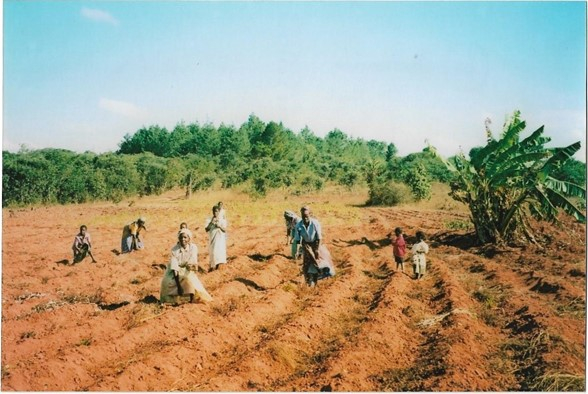
Another way
Thankfully, there is another way and since these problems were confronted by Tiyeni as a result of the provision of the land, a story of success through Deep Bed farming has emerged.
Detailed surveying is used to create a contour ridge, collect water and hold the soil in place. Every drop of rain that lands on a farm stays on the farm in the created percolation zone. The only way it can get away is through the subsoil, benefitting all the adjacent farms too.
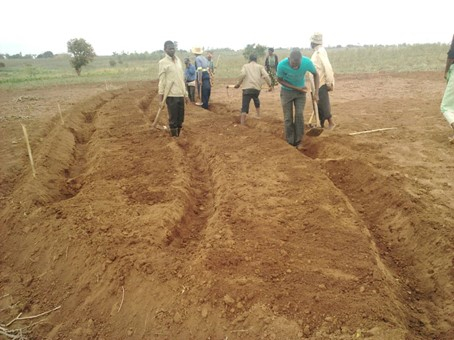
Deep Bed farming is common sense but not yet used commonly. There are over 2 million farmers in Malawi and your support helps us to reach more communities with climate smart agriculture. Creating opportunities for knowledge sharing through field events and training is the best way to help Malawi's farmers share and utilise climate smart knowledge.
Becoming a regular donor is a brilliant way of supporting Tiyeni. We offer the ability to donate an affordable amount which you are in control of via PayPal on our donate page - providing the maximum amount of benefit from your support in the easiest possible way.
With our warmest regards,
The Tiyeni team